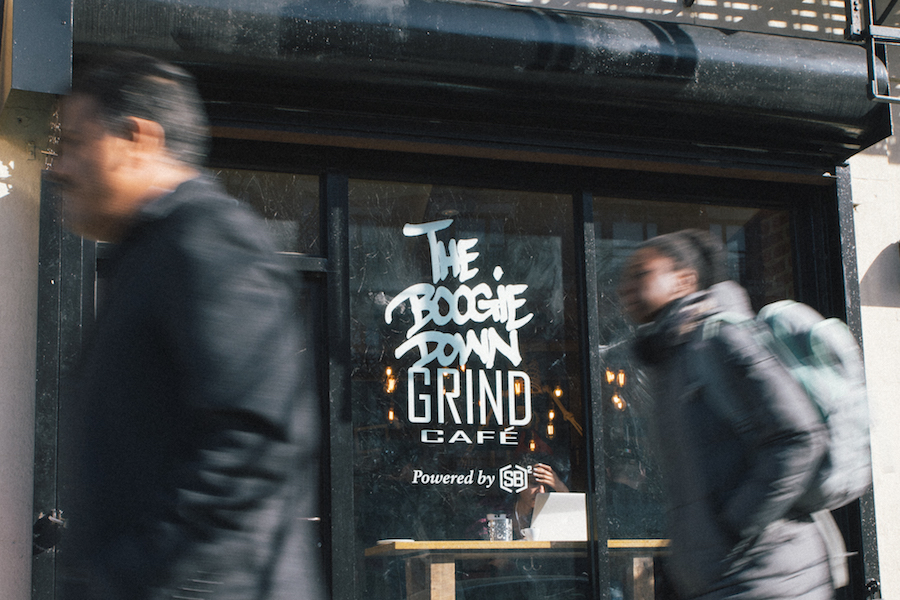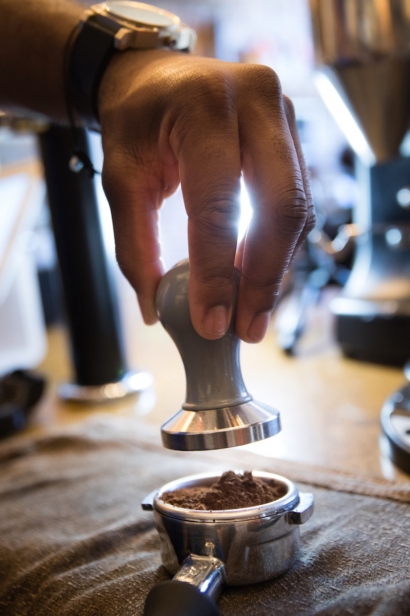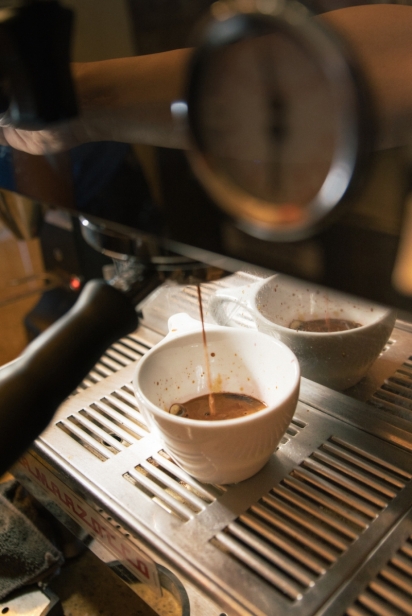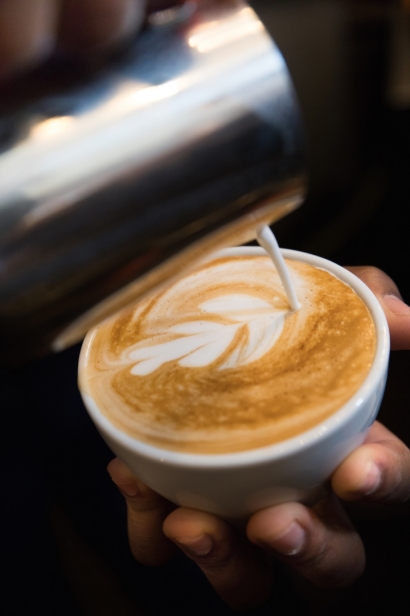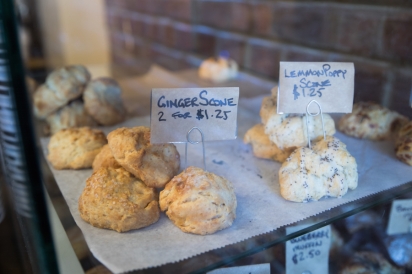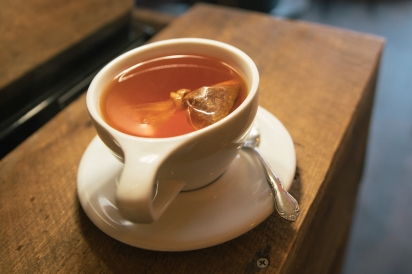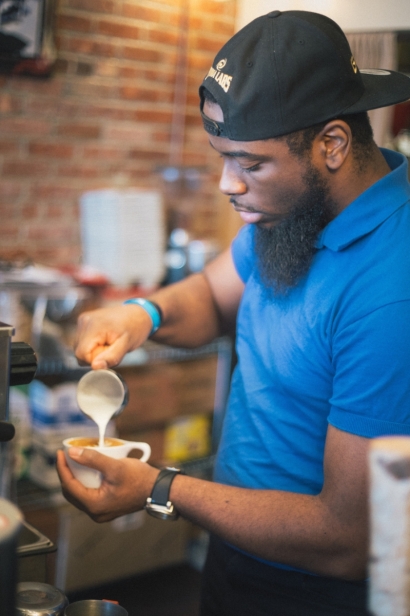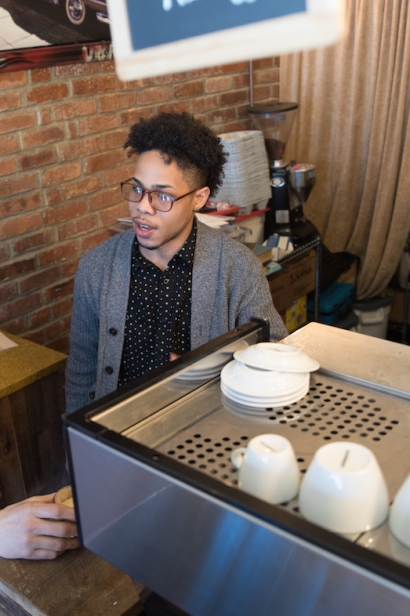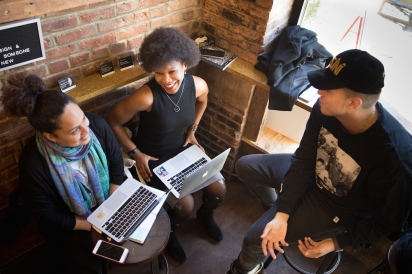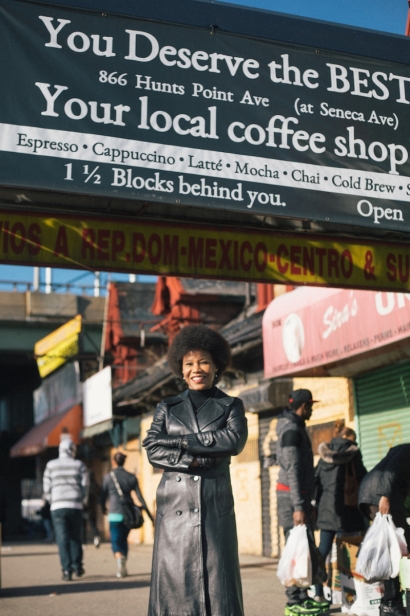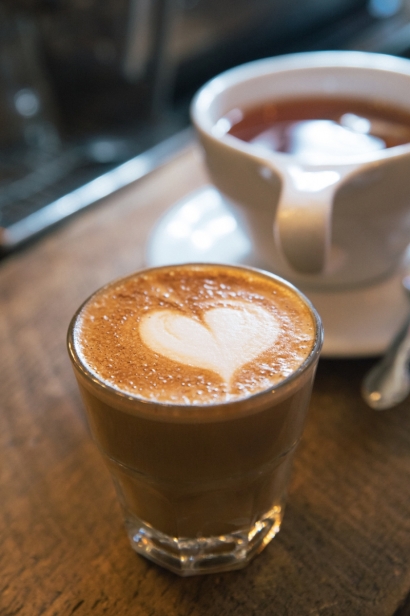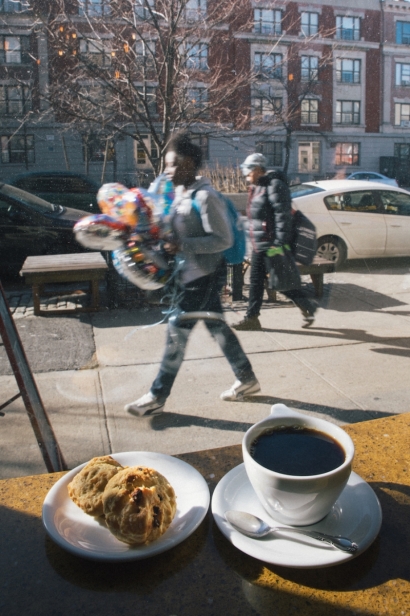Coffee Culture
Hunts Point native and local business owner Majora Carter has a resilient mindset about coffee culture in the Bronx. Rather than worry about looming gentrification, her philosophy insists that a small cup of grinds can foster huge economic and psychological empowerment for the community.
Walking into Carter’s new business, The Boogie Down Grind, which she co-owns with Bronx residents Sulma Arzu-Brown and Maurice Brown, is an immediate sermon to the gospel of coffee. There’s something about the earthy smell of roasted beans and the sweet fragrance of accompanying pastries that relax the body. It’s a sanctuary. It’s a place of jazz-playing Zen. Maybe that’s why it feels so easy to walk in, place an order, establish your own nook and either get to work or open up to a neighboring stranger.
While the new establishment has immediate charm and soul, it represents only one perspective of coffee matters in the Bronx. Another view consists of folks who view the nature of “fancy” coffee shops as foreign to the borough and therefore a threat because of the opportunity for outside investors to capitalize. As pleasant as quality coffee can be, to them it also carries a heavy stigma in a changing New York City.
Two years ago, Carter and her husband, James Chase, opened Startup Box on the corner of Hunts Point and Seneca Avenue—a revolutionary space in the historically disparate neighborhood that offers software testing and solutions to national clients and sustainable tech jobs to locals. The site is the genesis for The Majora Carter Group’s second business on the block, the café, which sits just two storefronts over at 866 Hunts Point Avenue. What many perceive as an opening for invasion, the duo is expressing intent on corralling for local opportunity.
The Boogie Down Grind is the offspring of a dissolved partnership between The Majora Carter Group and Long Island City–based chain Birch Coffee, which sprouted the location’s original opening six months ago. The decision to break away from Birch, and join forces with local business partners instead, derived from a need to take creative control of the café.
“The Birch guys will forever be our heroes,” says Chase. The chain’s financial investment in The Majora Carter Group’s vision is what made the business possible, both he and Carter admit. Where others have failed, they credit the Birch business model and approach to coffee quality for their half-year of success. Now it’s on to new beginnings, where Bronx-themed drinks like the “Grand Master Frappe,” and new food menu items like blueberry oatmeal and grits and cheese join forces with quality, micro-farmed, competitively priced joe.
Fans of the Birch brand of coffee will be happy to note that the change will not be a complete severance, but more like a passing of the baton as Birch will remain The Boogie Down Grind’s wholesale supplier of beans and trainer of their baristas. The café itself, however, will now become 100% Bronx local-owned.
Their work and investment in the community are not without its challenges—especially with pushback from some Bronx locals reacting to Carter’s words in a recent New York Times article. She was quoted saying that she prefers “self-gentrification” over anyone else gentrifying the neighborhood. What was likely meant with the best of intentions became an opening for criticism, as many residents are sensitive to the notion of gentrification, and rightfully so—we’re talking about a borough that’s been sliced open by poor urban planning, burned down by selfish landlords.
Justifying exceptional coffee and business practices in a historically disadvantaged community is an uphill battle, to say the least. “The first thing that we did was open up the software testing company as a way to show folks that it’s not just corner bodegas and pharmacies. People can walk to work and be in a legitimate place to earn OK money,” says Chase when discussing the economic implications of investing in Hunts Point.
Despite divisions about business and the borough’s past, The Majora Carter Group is clear on why they feel some of the Bronx is hesitant about their plans to grind. They argue that what’s at the heart of the fear isn’t about coffee at all—but the history of white flight and marginalization.
“We’ve been taught to have low expectations, so when we see something like this, we think, ‘Oh, it’s not for us,’” Carter says. It’s quite the recipe for what now actually inspires black and brown flight, or worse, apathy for everyone’s own backyard. “Something that we’re really fighting against is people feeling demoralized in their own space and community,” she goes on to say. Carter still remembers the pessimistic responses to her spearheading the greenification of the nearby waterfront a few years back. “Who’s going to come here for this?” she heard people say about the new park area. The irony being that it was, in fact, her intention to champion the change for community use.
While it’s true that both the landlord of the building and the community were hard-pressed to accept the idea of a sustainable and successful business like this in the neighborhood, the Carter Group has strategically and meticulously pulled it off. The Boogie Down Grind stands as a very new concept for the community. Coffee shops sit on almost every corner in downtown Manhattan, and are sprinkled about in uptown neighborhoods like Harlem and Washington Heights, but not in the South Bronx—until now.
Speaking with two of the café’s young baristas, David Tyson, 24, and Justin McMillan, 21, one gets a deeper sense of how employees from the community can change because of a new, locally owned business.
Tyson, a resident of Woodlawn, briefly describes his preference for working in the Hunts Point coffee shop more than others in the city, before going into detail about how Carter and Chase have inspired him to want to move into the neighborhood and foster his own goals. “Working and listening [to them] while they conduct their business meetings here inspires me to want to be here” he says.
For McMillan, a Hunts Point native who grew up knowing Carter and her family, it’s all about exploring his coffee-centric passion, describing his lifelong curiosity for coffee beans as a derivative of growing up watching his Puerto Rican grandfather enjoy the drink. It’s now transitioned into hands-on work and a tangible career, thanks to the new café. “My favorite thing is watching someone drink something I made. It makes me feel good that they enjoyed it,” he says.
While it was poor planning and white flight that desolated much of the South Bronx, the Carter Group and its partners also believe that there is still an opportunity for ownership by locals who choose to stay, financially equip themselves and reinvest. Business partner and Hunts Point resident Maurice Brown took the time to explain the impact that his investment will have on the neighborhood and his family.
“It’s important for people in the community to relate to the people that do business in it. Sulma and I have two little girls, and it’s important for them to see this. That we’re not selling or giving it away and then crying later,” he says. Even longtime leader and political representative Senator Ruben Diaz—someone who’s seen the ups and downs of the area—is praising the uplifting sociological implications of local business ownership. “While [Majora] could have opened her coffee shop in a trendy Manhattan location, she is showing her confidence in Bronx County,” he responded via his press staff.
Carter, in her still-resilient spirit, also took the time to express more clarity on her thoughts about outside invasion. “Gentrification doesn’t just happen when the doggie daycares open or when you start seeing white people in the neighborhood. It happens when kids grow up learning not to value the place that they live in.”
While it’s time that will tell the ultimate story of how things will evolve in Hunts Point, The Boogie Down Grind is clearly set on becoming the locally owned ground zero for connection among residents, visitors and the neighborhood. Pressure makes diamonds, grinding makes coffee and, in this case, coffee may make the community stronger.


